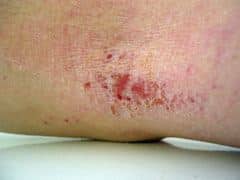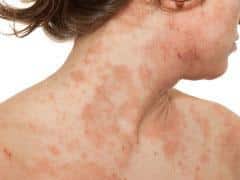
WHAT IS ECZEMA?
“Eczema” is usually used as a generalized term for a family of conditions that cause the skin to become red, flaky, scaly, irritated, itchy, oozy, cracked, blistered and/or swollen.
If you’ve ever dealt with an itchy, red, flaky eczema flare-up, you know just how irritating this common skin condition can be. At Skin & Beauty Center, our skilled dermatologists have treated countless patients with various types of eczema. Our seven convenient locations provide the most advanced eczema therapies to help patients ditch the itch and achieve calmer, clearer skin. To learn more about eczema triggers and treatments, read on or call 818-842-8000 to book an appointment.

WHAT ARE SOME OF THE MORE COMMON CAUSES OF ECZEMA?
Atopic Dermatitis: This is the most common form of eczema seen mostly in babies and in young children. It begins as intense itching, and then a red rash forms. It can become a chronic problem, so it is important to seek medical treatment early. People with atopic dermatitis have a problem with their skin barrier, so allergens and irritants are allowed into the skin more easily. Oftentimes, those with atopic dermatitis will also have personal or family history of allergies and asthma.
Contact Dermatitis: This is an irritation or allergic reaction to something that is coming in contact with the skin, resulting in a red, itchy rash. Common causes include nickel allergy, poison ivy and detergents. Treatment is aimed at eliminating the causative agent and application of topical medications to allow the skin to heal.

Seborrheic Dermatitis: This is a common condition affecting people of all ages. In infants it is known as “cradle cap”. In adults, it commonly affects the scalp, eyebrows, nasal folds, ears, chin, skin folds, chest and back. It is believed to be caused by overgrowth of normally occurring yeast on the skin. This causes a red rash with a yellowish, greasy scale and flaking,with or without itching. This condition generally flares throughout life and will require treatment which usually consists of antifungal agents, topical corticosteroid agents, topical calcineurin inhibitors, or medicated shampoos.
Hand Dermatitis: This is very common in industries involving cleaning, catering, metalwork, hairdressing, healthcare and mechanical work, or in any field that one’s hands are being washed a lot or involved in wet work. It often begins as red and dry skin that progresses to bumps and small vesicles with cracking, weeping and swelling. It can turn into a bacterial infection due to the loss of integrity of the skin.
Nummular eczema: Characterized by red, itchy, scaly spots in the shape of a coin. The cause is unknown and it is typically a chronic condition that has periods of flare and remission. It often worsens during winter months when skin becomes dry.


HOW IS ECZEMA DIAGNOSED?
Your dermatologist will work with you to try to determine the exact cause. It may be necessary to do a trial elimination of certain foods, jewelry, cosmetics, detergents, soaps, and fragrances. A skin patch test can help identify some of the more common allergens that could be causing the rash.
HOW IS ECZEMA TREATED?
Eczema can be extremely difficult and stubborn to treat, so it is important to be consistent with your appointments and with the treatment given to you by your dermatologist. Treatment options for eczema include topical medications, oral systemic medications, and light sources.
What Are the Best Over-the-Counter Eczema Treatments?
If you have mild eczema, you might be able to manage flare-ups at home with over-the-counter treatments. Keeping your skin hydrated with moisturizers can help reduce eczema symptoms. Look for products without heavy scents or dyes that contain soothing ingredients like aloe, glycerin, humectants, ceramides, mineral oil, petrolatum, or lanolin. Gentle anti-itch lotions like Aveeno® Eczema Therapy or CeraVe® Eczema Relief Creamy Oil can reduce inflammation, dryness, and cracked skin.
In addition to keeping your skin well moisturized, topical over-the-counter hydrocortisone cream can be applied directly to eczema patches to provide immediate itch relief. Additionally, medicated anti-dandruff shampoo could reduce dandruff flaking if you have seborrheic dermatitis. A cool colloidal oatmeal bath can also help soothe your skin.
What Can a Dermatologist Prescribe for Eczema?
Many people with eczema find that over-the-counter products aren’t effective enough. If you’re not finding relief with home remedies, it’s worth visiting an experienced dermatologist at Skin & Beauty Center. A dermatologist can prescribe more potent topical steroids, including hydrocortisone, desonide, fluocinolone, and triamcinolone.
Calcineurin inhibitors, like tacrolimus and pimecrolimus, are another topical option and alternative to steroids. These are sold under the brand names Protopic® and Elidel® and alter your immune system to reduce flares. JAK inhibitors like OPZELURA™ or RINVOQ® also change how your immune system reacts to reduce inflammation. This treatment can be taken orally or applied topically.
If preventing flares in the first place is a priority, phosphodiesterase 4 (PDE4) inhibitors can be prescribed to patients three months and older. Crisaborole, sold under the brand name EUCRISA® can reduce itchiness, redness, and the frequency and severity of flare-ups.
Your provider might prescribe an oral immunosuppressant like cyclosporine or methotrexate if your eczema is severe and unresponsive to other treatments. However, these medications weaken your immune system, increasing your risk of developing other illnesses or infections.
If immunosuppressants aren’t a safe option for you, phototherapy could help manage your symptoms. This eczema treatment uses narrowband UVB light to decrease itch and inflammation. You might initially need several sessions per week to see improvement, but it’s often an effective option for patients who don’t respond well to other treatments.
What Triggers Eczema Flare-Ups?
As part of your treatment plan, our dermatologists could suggest tracking potential eczema triggers and eliminating them when possible. Common irritants include harsh soaps, cosmetics, household cleaners, and detergents. Those with food allergies like dairy, nuts, or gluten might also notice a flare when exposed. Pet dander, pollen, and mold could also trigger your eczema.
Some eczema triggers are difficult or impossible to avoid. For example, many women notice an increase in eczema symptoms during pregnancy or a few days before their periods due to hormonal changes. Dry, cold weather is another common trigger, but using a humidifier and applying eczema-friendly moisturizers can help.
Schedule an Eczema Consultation
To schedule an Eczema consultation or to make an appointment, please call us at 818.842.8000 or fill out an online contact form and our office will be in touch with you. Thank you for choosing Skin & Beauty Center in Southern California!
